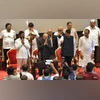Maharashtra Speaker Rahul Narwekar will issue an order on January 31 on the disqualification of MLAs of the Nationalist Congress Party (NCP) from the membership of the State’s Legislative Assembly. Earlier this month, he cleared the air on disqualification petitions filed by the two factions of Shiv Sena. With the two orders, the process of division of political parties in Maharashtra will be settled – at least for now. Parties, as voters know them, will no longer exist, leading to the formalisation of deep fissures in party politics.
In October last year, NCP leader Supriya Sule and Shiv Sena (Uddhav Balasaheb Thackeray) group leader Anil Desai filed a petition in the Supreme Court seeking ‘justice’ and disqualification of MLAs after the Shiv Sena split into two groups, one led by Eknath Shinde. The MLAs of the breakaway Shiv Sena group together with the Bharatiya Janata Party (BJP) staked claim to form the government. This coalition was later joined by MLAs from the NCP led by Ajit Pawar. All who had crossed the floor said in court that they should not be disqualified.
The Supreme Court said Narwekar, a lawyer by training, was the appropriate authority to decide on the status of MLAs who had broken away from their parties, although it noted that the whip issued by the party leader was illegal. Narwekar, in his decision on January 10, said the Shinde faction of the Sena was the ‘real’ Shiv Sena and that the whip was not illegal. Significantly, he disqualified no MLA of any party.
A few months after that split, the NCP also split, with Ajit Pawar walking out of the party with NCP MLAs. Although the Shinde-BJP grouping already had the numbers, the addition of NCP MLAs meant it became virtually unassailable. The Speaker will address that split on January 31. That case is also before the Supreme Court but no date has been fixed for the order. Given the previous order issued by Narwekar, it is unlikely that the outcome in the NCP split case will be any different.
But in any case, the Shinde-Fadnavis-Pawar government is now safe till October-November 2024, when assembly elections are due. While both Sule and Uddhav Thackeray have pledged to continue the fight in the apex court, the government has said the people’s court is now the forum that will decide.
How much will the fractures and splits in political parties affect the Lok Sabha and assembly election outcome?
The first question is whether the Shinde government will advance assembly elections to hold them together with the May 2024 Lok Sabha polls. In 2019, then-BJP chief minister Devendra Fadnavis was categorical. He said there was no chance of assembly elections being held simultaneously with Lok Sabha polls. This time, he is not saying a word.
“It is hard to predict what will happen. We know that (assembly) elections will be held with the Lok Sabha polls in Haryana, leveraging Narendra Modi. Will the current Maharashtra government also go down that road? Doing so will be an admission of weakness,” said former chief minister and Congress leader Prithviraj Chavan.
“The people are very critical of the Speaker’s orders legitimising the government. Eknath Shinde is not an effective chief minister beyond Thane (his constituency). Corruption is at unimaginable levels. The BJP would like to replace him (Shinde) but it is unable to do so without looking bad. In this scenario, the Speaker’s orders become quite crucial,” he said.
Chavan believes the Ram Mandir issue will consolidate the votes of existing BJP supporters but was sceptical when asked if the temple inauguration will represent any additional support for the BJP-Sena alliance.
The BJP, Shinde-led Shiv Sena and Pawar-led NCP faction, called Mahayuti, includes seven other parties. Most of them represent no more than a few assembly seats and have a marginal presence in Lok Sabha constituencies. The real danger to Mahayuti comes in terms of reputational damage: as the very MPs and MLAs who stood up to denounce the BJP are now part of the coalition led by that party.
This is not the only danger looming on the horizon. The resurgence of the Maratha reservation issue led by activist Manoj Jarange Patil threatens parties across the board.
Patil has announced that his march from Jalna to Mumbai, involving farmers, will begin on January 24, if the government fails to announce a reservation quota for Marathas by January 20. Farmers have been asked to keep tractors ready to block roads and highways leading to Mumbai if the government does not act. Efforts are on to persuade the activist.
On the other hand, Prime Minister Narendra Modi’s January 12 programmes in Maharashtra, especially in Nashik, evoked an enthusiastic response. Investment amounting to nearly ~ 20,000 crore was committed to Maharashtra. Lok Sabha Yojana Baithaks (meetings) have been ordered by the central BJP where the party’s state leadership is expected to hold meetings. Maharashtra interactions are also on the cards.
But both the Congress-NCP-led Maharashtra Vikas Aghadi (MVA) and the Mahayuti have suffered fractures. This makes candidates rather than parties more important, especially in the assembly election context: making the outcome of the two elections in the state extremely unpredictable.
Unlock 30+ premium stories daily hand-picked by our editors, across devices on browser and app.
Pick your 5 favourite companies, get a daily email with all news updates on them.
Full access to our intuitive epaper - clip, save, share articles from any device; newspaper archives from 2006.
Preferential invites to Business Standard events.
Curated newsletters on markets, personal finance, policy & politics, start-ups, technology, and more.
)